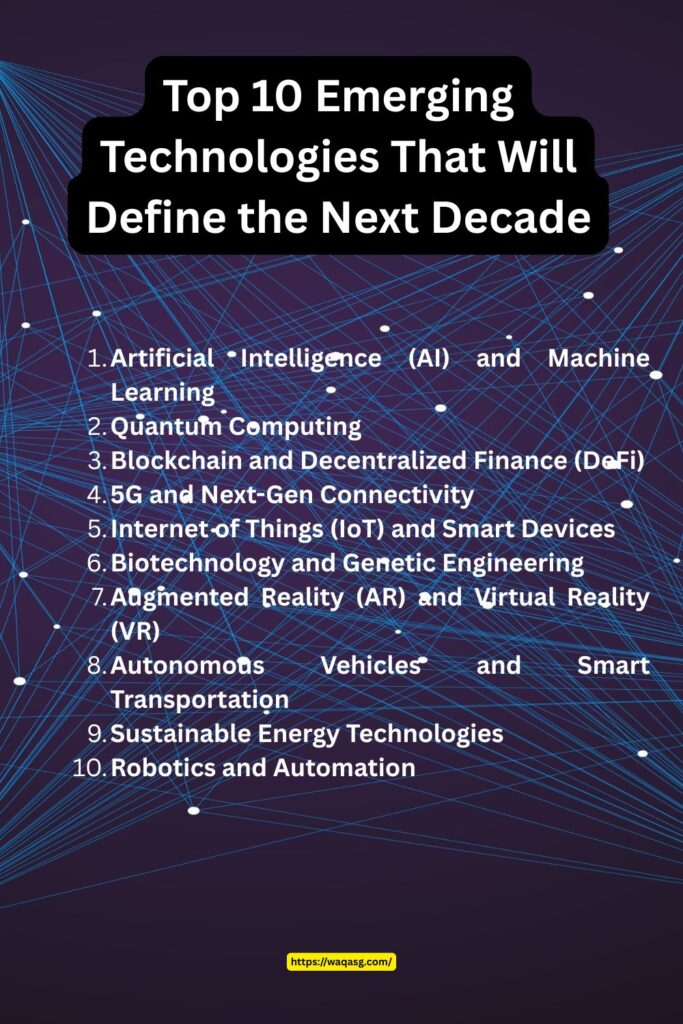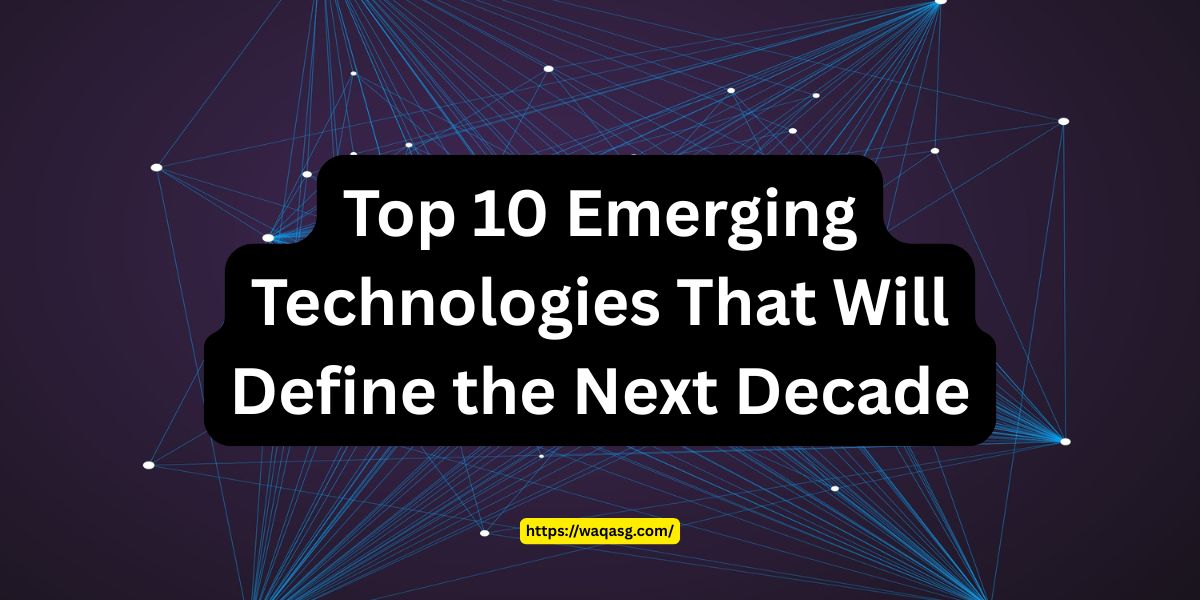Top 10 Emerging Technologies That Will Define the Next Decade
Introduction
Technology is evolving at an unprecedented pace, shaping the way we live, work, and interact with the world. Over the next decade, several emerging technologies will drive transformation across multiple industries, from healthcare and finance to communication and transportation. These innovations will not only improve efficiency but also redefine possibilities, solving some of the most pressing global challenges. In this article, we explore the top 10 emerging technologies that are set to shape the future.
1. Artificial Intelligence (AI) and Machine Learning
AI and machine learning continue to be at the forefront of technological advancements. From self-learning algorithms to real-time predictive analytics, AI is revolutionizing industries such as healthcare, finance, and customer service.
- AI in Healthcare: AI-powered diagnostics and robotic surgery are improving patient outcomes and medical research.
- AI in Business: Companies use AI for automation, fraud detection, and personalized customer experiences.
- AI in Everyday Life: AI assistants like Siri, Alexa, and Google Assistant enhance convenience and productivity.
Read more about how AI is shaping our world.
2. Quantum Computing
Quantum computing is poised to solve complex problems beyond the reach of classical computers. By leveraging quantum mechanics, these computers perform computations exponentially faster.
- Cryptography: Quantum computing will break traditional encryption methods while enabling quantum-resistant security solutions.
- Drug Discovery: Pharmaceutical companies will benefit from faster molecular modeling and simulations.
- Financial Modeling: Quantum computers will optimize risk assessments and fraud detection in banking.
Explore the future of quantum computing.
3. Blockchain and Decentralized Finance (DeFi)
Blockchain technology is moving beyond cryptocurrencies, transforming industries with its transparency, security, and decentralization.
- Smart Contracts: Automated agreements remove intermediaries in business transactions.
- Supply Chain Management: Blockchain enhances traceability and reduces fraud.
- Decentralized Finance (DeFi): Peer-to-peer financial services eliminate traditional banking barriers.
Learn more about how blockchain is changing industries.

4. 5G and Next-Gen Connectivity
The rollout of 5G networks is paving the way for ultra-fast internet speeds, low latency, and seamless connectivity.
- Smart Cities: 5G supports intelligent traffic systems, smart grids, and IoT networks.
- Remote Work & Education: High-speed internet will enhance virtual learning and remote work capabilities.
- Augmented & Virtual Reality (AR/VR): 5G improves AR/VR experiences for gaming, training, and simulations.
5. Internet of Things (IoT) and Smart Devices
The IoT is expanding rapidly, with billions of interconnected devices streamlining daily activities and business operations.
- Smart Homes: IoT enables automated lighting, climate control, and security systems.
- Industrial IoT (IIoT): Factories use IoT sensors for predictive maintenance and efficiency optimization.
- Healthcare IoT: Wearables and remote monitoring improve patient care.
Discover how IoT is transforming our lives.
6. Biotechnology and Genetic Engineering
Advancements in biotechnology are revolutionizing medicine, agriculture, and environmental conservation.
- CRISPR Gene Editing: Precise genetic modifications are enabling disease prevention and treatment.
- Synthetic Biology: Scientists are engineering new biological systems to address food security and sustainability.
- Personalized Medicine: DNA sequencing enables tailored treatments for patients.
7. Augmented Reality (AR) and Virtual Reality (VR)
AR and VR are reshaping entertainment, education, and workplace training.
- Education & Training: AR/VR provides immersive learning experiences for students and professionals.
- Gaming & Entertainment: Virtual worlds and interactive experiences are redefining user engagement.
- Retail & Real Estate: Virtual try-ons and property tours enhance shopping and home-buying experiences.
8. Autonomous Vehicles and Smart Transportation
Self-driving technology is progressing rapidly, promising safer and more efficient transportation solutions.
- Autonomous Cars: Companies like Tesla and Waymo are refining self-driving vehicles.
- Smart Traffic Systems: AI-driven traffic management reduces congestion and improves urban mobility.
- Drones & Delivery Robots: Automated delivery solutions enhance e-commerce logistics.
9. Sustainable Energy Technologies
With climate change concerns rising, renewable energy innovations are gaining momentum.
- Solar & Wind Power: Advancements in energy storage and grid management are making renewables more viable.
- Hydrogen Fuel Cells: Hydrogen energy is being explored as a clean alternative for transportation and industry.
- Carbon Capture: Emerging technologies aim to reduce carbon emissions and combat global warming.
Read about the future of renewable energy.
10. Robotics and Automation
Automation is reshaping industries by increasing efficiency and reducing human labor in repetitive tasks.
- Manufacturing & Logistics: AI-powered robots optimize production and warehouse management.
- Healthcare & Surgery: Robotic-assisted surgeries enhance precision and recovery times.
- Service Industry: Chatbots and robotic assistants improve customer interactions.
Conclusion
The next decade will witness a technological revolution across industries, driven by artificial intelligence, quantum computing, 5G, blockchain, and other emerging innovations. As these technologies continue to evolve, they will not only enhance efficiency but also reshape economies, create new job opportunities, and solve critical global challenges. Staying informed and adapting to these advancements will be crucial for businesses, professionals, and individuals looking to thrive in the digital age.
Whether you’re an entrepreneur, student, or tech enthusiast, understanding and embracing these emerging technologies will be key to navigating the future. The rapid pace of innovation is unstoppable—now is the time to prepare for the next era of transformation.


